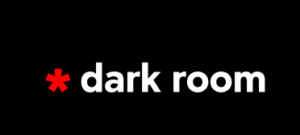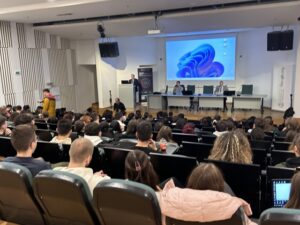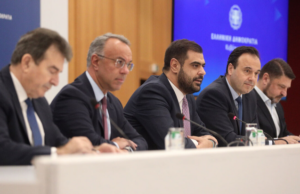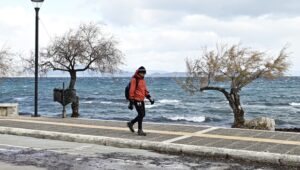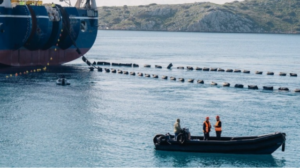Hello, I found last night’s interview of K.M. on Alpha (with Sroiter) quite interesting in several aspects, and I’ll highlight some points that represent certain changes. First of all, regarding his stance on the Samaras-Karamanlis duo, who have been systematically attacking him for the past few months without any apparent reason. After all, being a former prime minister (and former leader of New Democracy) and attacking the current prime minister over the sacrilege of gay marriage or under the pretext of the Greek-Turkish dialogue that hasn’t even started yet—well, everyone pretty much understands that the two former leaders are burdened by entirely different concerns. Mitsotakis directly addressed Samaras regarding the accusations he recently launched about “flirting with Erdogan” and indirectly critiqued Karamanlis for disagreeing with the idea of expelling Samaras. I mention this because, until now, K.M., even when faced with extreme attacks from various quarters—whether political or business-related—either wouldn’t respond or softened his statements to the point that the intended message barely reached its recipients. Perhaps the time has come for him—as has been the case for most of his predecessors as prime ministers—to realize that when governing, direct confrontations are inevitable, as long as they are not obsessive or unfair, given the dignity of the office he represents. But, anyway, the truth is that, after a point, the two former leaders were tightening the screws on Mitsotakis, leaving him with no other option—especially Samaras.
Electoral Law
In the same interview, K.M. was asked about the electoral law. While he didn’t want to delve into the topic, I have a theory/report, and I think I’ll write it here since columns like this are for such musings and not just hard facts—otherwise, no one would read us! First of all, let me remind you that Mitsotakis has been toying with (or is being toyed with by…) the idea of changing the electoral law since 2021. It’s practically a taboo for him, which is why he didn’t make any changes during his first term, even though he came close to pulling the trigger several times. Today, it’s unclear where any change in the electoral law might lead in terms of political developments. There’s undoubtedly a completely “fragmented landscape” in Parliament reminiscent of the first bailout era, if not worse. But if the threshold for entering Parliament is raised to 4% or 5% (from 3% currently), who would benefit politically—the first party, or the second and third? Would fewer parties entering Parliament mean the first party gains more seats? Or, if more parties make it in, would the first party be strengthened through the chaos theory in the second round? Might this lead to a third election round? Knowing K.M.’s style, which doesn’t lend itself to such “games,” I’d say that if he does make a move, it would be something significant. And I’d venture to suggest that if he changes the electoral law, it won’t be for some opportunistic, short-term adjustment like raising the threshold by one or two points. It would more likely be a shift to, say, the German electoral model, which is considered one of the most modern and fair systems in Europe (albeit with variations). Keep that in mind. Not to mention, its basic version makes it easier to form a government with just 33%-34%. What do you think?
The Cyprus Dinners
Mitsotakis’ beaming appearance with Christodoulides was also an obvious message to Samaras (in case he didn’t get the point from what was said to Sroiter). Generally, the atmosphere from Nicosia was exceptionally positive. And why wouldn’t it be, after all, when the two sides communicate perfectly? I’m told that at noon, Mitsotakis, Christodoulides, and King Abdullah of Jordan—who was also there for a trilateral meeting—shared lunch at the Presidential Palace. Meanwhile, the ministers, who were numerous, had a scheduled meal at the luxurious “Rous” in Nicosia, a restaurant specializing in fine dining à la Cypriote.
“Voluntary” Initiatives by the Banks
One doesn’t need inside information or specialized knowledge. A little intuition suffices because the situation is obvious. The scenarios of an extraordinary tax on banks were met with lukewarm reactions from the government right from the start. Yesterday, the government spokesperson informed us that “no decision has been made” (so it’s being discussed), as the government is “considering all tools at its disposal” (therefore, including taxation). The spokesperson, who carefully chooses his words, urged banks “to adapt to citizens’ needs and, through a series of decisions, reduce the burdens and charges on them. This is the government’s goal, and it will exhaust every means it has toward this direction.” The message couldn’t have been clearer, which is why bank stocks took a hit in yesterday’s trading session. It’s not hard to imagine the discussions happening behind closed doors between the government and bankers—talks that aren’t proceeding as expected, leading to the above outcomes. Conclusion: We’ll wait to see if, in the coming period, there are “voluntary” initiatives from the banks. If so, they’ve bought themselves time. At the same time, let’s keep a closer eye on polling trends.
Preparing for London
Those citing obstacles to a possible extraordinary tax on banks, like the reduction of the DTC or the roadshow in London, have understandable and valid arguments, but it always depends on perspective. Speaking of the Morgan Stanley and HELEX roadshow in London (December 2 & 3), I’ll add that flights to London will be packed in the coming days with CEOs, bank executives, listed company representatives, and government officials attending the investment conference. On Monday morning, Prime Minister Kyriakos Mitsotakis is scheduled to attend a roundtable discussion with institutional investors, followed by a conversation, as he did last year, with Luigi Rizzo, Vice Chairman of Investment Banking EMEA at Morgan Stanley. Energy issues will undoubtedly feature at the conference, with a fireside chat involving Evangelos Mytilineos and Michael O’Dwyer, Managing Director for Oil & Gas Investment Banking at MS. Additionally, there will be a panel featuring companies that recently joined the Athens Stock Exchange (Athens International Airport, Bank of Cyprus, Optima), followed by a lunch break. Later, Greek bank CEOs Karavias, Megalou, Mylonas, and Psaltis will take the stage. The first day wraps up with a discussion between the Prime Minister’s economic advisor, Alex Patelis, Mike Wilson (Chief Investment Officer and Chief U.S. Equity Strategist at Morgan Stanley), and Ellen Zentner (Chief Economist and Head of Macro and Thematic Investments at Morgan Stanley Wealth). Numerous meetings between listed companies and fund managers or analysts have already been scheduled, and additional ones are being arranged on the sidelines of the conference, which will take place at Morgan Stanley’s impressive Cabot Square premises overlooking London’s docks.
All hopes rest on a festive December
December is a peculiar month for institutional portfolio managers. The entire month (including the session on December 31st) counts toward the valuation of the portfolios they will present at year’s end, as well as the bonuses they aim to secure. Many are pinning their hopes on a year-end rally of our stock market, yet they are currently refraining from bold investments. Across the Atlantic, managers dealing with Greece had their attention diverted by the aroma of turkey and the festive consumer-driven long weekend that followed. U.S. stock markets are closed today and will close early tomorrow (1:00 PM local time) due to the Thanksgiving holiday. The bond market in New York is also closed today and will close at 2:00 PM tomorrow.
Institutional investors and mutual funds to pocket €112 million
The acquisition deal of TERNA Energy by Masdar of the United Arab Emirates is finalized today with the transfer of shares on the stock exchange. Immediately afterward, a public tender offer for the acquisition of minority shares will follow. It’s no small amount of money—essentially, it’s a liquidity injection of around €112 million that institutional investors and mutual funds will collect. A characteristic example is the Greek Social Insurance Institute (IKA), which holds 1.57 million TERNA Energy shares in its portfolio and will collect €30 million, which it will likely reinvest in our market. Similarly, Piraeus Bank, which as of September 30 held 896,000 shares, will receive €18 million.
The loans for LAMDA’s malls
LAMDA Group is finalizing bank financing for the development of two new shopping malls within the Hellinikon project, located near Vouliagmenis Avenue and the marina. This emerges from recent moves by group companies. Following a flurry of capital increases earlier this month in subsidiaries such as Lamda Ellinikon Malls Holding, Lamda Malls, Lamda Vouliagmenis Mall, and Lamda Riviera, the group is now proceeding to the next step involving collateral arrangements. Decisions have already been made, starting with Lamda Riviera’s board, which approved consent for a second-tier mortgage pledge on a surface rights property covering 131 hectares within Hellinikon. Similarly, the board of another group subsidiary, Lamda Domi, which is associated with the Golden Hall shopping center in Maroussi, approved a pledge on the usufruct rights for the exclusive exploitation, use, management, and operation of the building known as the “International Broadcasting Center” (where the popular shopping center on Kifisias Avenue is housed). This usufruct right was established in 2013 following a Hellenic Republic Asset Development Fund (TAIPED) tender for the 90-year property concession. These actions are being taken in favor of Eurobank, representing the bondholders of the underlying bond loan, to secure all claims of the latter against the indirect 100% parent company, LAMDA Malls. These claims stem, or will stem, from the common bond loan worth up to €101 million, divided into a maximum of 101,000,000 nominal bonds issued by the borrower and indirectly owned 100% by LAMDA Malls. “This approval was deemed appropriate, as providing the above collateral promotes corporate interests, given that the financing, under which this tangible collateral is provided, is expected to benefit the entire LAMDA Development group of companies,” as stated in related decisions.
The Gordian knot of OSE
The Greek Railways Organization (OSE), undergoing transformation into a unified body, remains leaderless. It lacks a president, a board of directors, and an administrative mechanism. The release of €650 million was secured to initiate repair works for the damages caused by Storm Daniel in Thessaly, yet no one is authorized to sign off on the restoration of the Palaiofarsala-Kalambaka and Larissa-Volos railway lines. According to the schedule, the new unified Railways Authority is set to commence operations on January 1, 2025. The company being absorbed, ERGOSE, has a functioning administration, a president, and a board of directors. The absorbing company, OSE, which theoretically should be in a state of readiness, seems rather disoriented. The government has received proposals, reportedly suggesting the suspension of passenger services for two years, limiting operations to freight transport on single-track lines. Exceptions to the cessation of passenger transport would naturally include suburban routes such as Athens-Airport, Athens-Halkida, Athens-Corinth, and Larissa-Thessaloniki. This drastic measure would allow for railway renovation projects to begin, with the aim of providing the country with a reliable rail transport solution within a two-year horizon.
Call for Greek companies to work in Ukraine – Registry in the making
The Hellenic Republic Asset Development Fund (TAIPED), through its Strategic Importance Contracting Unit (PPF), aims to claim a share of the massive pool of projects being launched in Ukraine and the Western Balkans with EU funding. Recent legislative changes allow the Unit to participate in actions and international collaborations outside Greece financed by EU funds, with the initiative already codenamed “Beyond Greece Mission.” Toward this goal, a call for expressions of interest in creating a registry of Greek companies and experts was issued the day before yesterday. This registry will serve as a “pool” of partnerships with the PPF for joint participation in future related tenders. The intention is to establish a domestic ecosystem of service providers for the planning and implementation of international projects, ensuring that all relevant procedures up to tender announcements are carried out and executed by Greek business entities. Interest has been expressed, including for projects in Ukraine, such as the construction or repair of hospitals, schools, and infrastructure, among others.
Trade Estates and the Retail Park in Patras
Trade Estates is striving to stand out in this challenging period for its sector by specializing in the field of commercial real estate. For the past month, the retail park in Patras has been operational, first with IKEA, followed by all the other retail stores. The park’s revenues in this first month are rivaling those of Thessaloniki and Athens and are surpassing initial projections. The opening of the park before the end of the year had not been included in the company’s guidance, which is why, according to CEO D. Papoulis, all indications point to the subsidiary of the Fourlis Group exceeding its 2024 estimates. On December 16, an interim dividend of €0.047706 per share will be distributed. Based on the current market capitalization on the Athens Stock Exchange and on an annualized basis, the dividend yield exceeds 6%. With this in mind, Trade Estates is boldly participating in presentations in London (Morgan Stanley) and Prague (Wood).
Stock Market: Coca Cola HBC Held the 1,400 Points
In Athens, investment apathy persisted, and day traders seized the opportunity to “play” with bank stocks, citing political developments in France and rumors of an extraordinary tax on banks in Greece. The General Index once again relied on the support of Coca Cola HBC to hold the 1,400 points (-0.31%), with transactions reaching €88.2 million due to €8 million in block trades. The rise of +1.84% in Coca Cola to €34.32, and of Cenergy (+1.9%) to €8.60, along with the unstoppable TITAN, the liberated ELLAKTOR, and the expectation-filled GEK TERNA, mitigated the losses of the General Index and left hope for a better December.
Interest Rates: The ECB Rushes, the Fed Waits
Tomorrow, inflation data for the Eurozone will be announced, which—according to the official stance—will determine the ECB’s approach to Euro interest rates. However, this is only half the story. The other half lies in the fact that the European economy is tired, wheezing, and cannot run without the support of monetary policy. For this reason, a fourth interest rate reduction of ¼ percentage point since last June is considered a given. Europe’s problem is not inflation but the purchasing power of its citizens, which is tied to the anemic growth of its economies. Conversely, across the Atlantic in New York, the Fed is willing but not rushing to cut rates. The U.S. GDP grew by +2.8% in the third quarter of the year, fueled by the insatiable consumerism of Americans, with consumption increasing by +3.5%. The Personal Consumption Expenditures (PCE) Index, which reflects inflation across a broad spectrum of consumer spending, rose by +2.3%. Jerome Powell is waiting to see the policies of the new government and will adjust his approach accordingly, given that the strong dollar acts as a deflationary shield.
New York…Ran Out of Eggs!
Americans are celebrating Thanksgiving, and that means the whole family gathers around a table for the traditional turkey. However, according to CNN, the surge in avian flu and the holiday season caused a sudden spike of +30.4% in egg prices in October compared to last year. Avian flu, transmitted through wild birds, has been plaguing farmers and the egg market since January 2022. The virus has killed 108 million birds since then, 75 million of which were egg-laying hens, according to the American Farm Bureau Federation. Cases began to rise again last month, with avian flu killing 2.8 million egg-laying birds in key egg-producing states like Oregon, Utah, and Washington. The losses amount to about 60 million eggs, according to a U.S. Department of Agriculture report. Since Thanksgiving without eggs is unthinkable, Americans have started importing. New Yorkers, in particular, are willing to pay more, and now the price of eggs has reached and surpassed $5 per dozen, similarly affecting the price of pasta and mayonnaise.
